DAVE'S DIARY - 10 SEPTEMBER 2008 - JERRY REED OBITUARY
JERRY REED RIP @ 71
BORN
JERRY REED HUBBARD - MARCH 20, 1937 - ATLANTA, GEORGIA
DIED SEPTEMBER 1, 2008 - NASHVILLE, TENNESSEE
MOVIES, GRAMMIES AND HITS
"East bound and down, loaded up and truckin'/ we gonna do what they say can't be done/ We've got a long why to go and a short time to get there/ I'm east bound just watch ol' Bandit run." - East Bound And Down - Jerry Reed-Dick Feller
When multi-Grammy award winning singer-songwriter, guitarist and actor Jerry Reed died at 71 he ensured good karma.
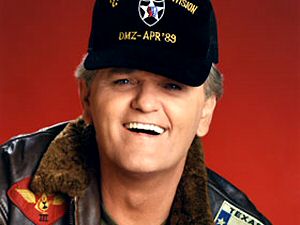 |
As
his health declined in recent years he focused on spiritual studies
and highlighting veterans' issues. "For 50 years, all I'd done was take, take, take," he told The Tennessean's Tim Ghianni in 2007. "I decided from now on it is going to be giving. And I'm way behind. We're all way behind. We live this life like what's down here is what it's all about. We're temporary, son, like a wisp of smoke." |
Ironically, Reed died in a Brentwood hospice from emphysema.
It was almost
a decade after Reed had quadruple bypass surgery in June 1999.
But the much-loved larrikin left a legacy of laughter in comedic hits
and movie roles that preceded the celluloid success of many peers.
Reed developed an avid following in Australia for his guitar playing on
his hits, tunes he wrote for Elvis Presley and movies with actors diverse
as Burt Reynolds and Adam Sandler.
They included Reynolds's Smoky & The Bandit trilogy and W.
W. and the Dixie Dancekings in 1974.
Two years later, he was in Gator, also with Reynolds, and more
than a decade later in Adam Sandler movie The Waterboy.
Reed won a Grammy for When You're Hot, You're Hot in 1971.
A year earlier, he shared a Grammy with Chet Atkins for their collaboration,
Me and Jerry.
And two decades later in 1992, Atkins and Reed won a Grammy for Sneakin'
Around.
Reed continued performing on the road into the late 1990s, doing about
80 shows a year.
"I'm proud of the songs, I'm proud of things that I did with Chet
Atkins, I'm proud that I played guitar and was accepted by musicians and
guitar players," he told Associated Press in 1992.
Latter day hits included #1 smash She Got the Goldmine (I Got the Shaft)
in 1982, and The Bird, (including impressions of Willie Nelson
and George Jones), hit #2.
His last hit, I'm a Slave, charted in 1983.
Reed's success as recording artist and film star overshadowed his talent
as songwriter and musician.
He wrote more than 320 songs, including A Thing Called Love, a
#2 hit for Johnny Cash.
As a session guitarist, he recorded with Waylon Jennings, Bobby Bare,
Ian & Sylvia, Joan Baez and Ringo Starr and many others.
Reed continued acting and recording to join Waylon Jennings, Mel Tillis
& Bobby Bare to form the Old Dogs who cut two albums of songs by late
Playboy cartoonist and author Shel Silverstein in 1998.
It was a boomerang of sorts - under the tutelage of the late Chet Atkins
his session clients included Waylon, Bare and Tillis.
Reed leaves behind wife Priscilla Mitchell, whom he married in 1959 and
their two daughters Charlotte Elaine "Lottie" Reed Stewart,
and Seidina Ann Reed Hinesley, born April 2, 1960.
ORPHANAGE TO ARMY
"When you're hot, you're hot/and when you're not, you're not/put all the money in and let's roll 'em again/when you're hot, you're hot." - When You're Hot You're Hot - Jerry Reed.
Reed was
born in Atlanta to cotton mill workers Robert Spencer Hubbard and Cynthia
Hubbard, who divorced in their son's first year.
From autumn of 1937 until 1944, he lived in orphanages and foster homes.
He rejoined his mother when she married mill worker Hubert Howard in 1944.
Transfixed by music, he listened to the Grand Ole Opry on radio each Friday
night, jumping around on a woodpile in lieu of a stage, and playing a
hairbrush as surrogate rhythm guitar.
Cynthia Howard bought a used guitar from a neighbour for $7, gave it to
her son and taught him two chords.
He began striking the strings with a thumb-pick - a practice he continued
throughout his career.
When a guitar teacher told him to discontinue that method, Reed dropped
the teacher rather than the pick.
Hearing finger-style guitarist Merle Travis play I Am A Pilgrim
caused Reed to aspire to something beyond simplicity.
"I thought when I heard it, 'Boy, there it is! That man is walking
with the big dog. He knows where the bodies are buried, and I want some
of that,'" he told Bob Anderson in a 1979 interview.
He spent high school honing musical and performing chops and displaying
talent and magnetism that set him apart from others at school.
AUNT MEG'S WOODEN LEG
"When that bird sailed out the door, and he was gone/and as he faded in the night he was singing this song/on the road again/ I just can't wait to get on the road again somebody stop that bird!/ the life I love is making money with my friend/ and I can't wait to get on the road again." - The Bird - Hal Coleman, Barry Etrics.
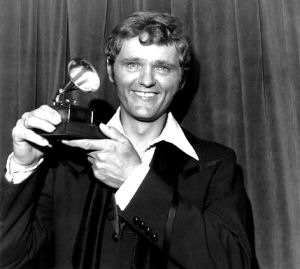 |
In
1954, he played a self-penned song called Aunt Meg's Wooden Leg
for Atlanta publisher and radio host Bill Lowery, who began managing
and booking him. A 30-day tour opening shows for Ernest Tubb and the Texas Troubadours ensued, and was enough to convince Reed that high school was of little use to him. "I knew what I was going to spend my life doing," he later said. "Nothing else made any sense. Nothing else made any difference." |
In 1954, a 17-year-old Reed played a show in Atlanta in honour of country star Faron Young, who had been discharged from the Army.
Ken Nelson,
who ran Capitol Records, attended the Atlanta show.
Lowery, who hired Reed as a disc jockey at Atlanta's WGST, told Nelson
he should sign the cotton mill boy from Georgia.
Reluctant to sign such a young act to Capitol, Nelson acquiesced.
He told Reed to wait until his 18th birthday before recording, and in
October of 1955 the men entered a Nashville studio and made a record.
First single If The Good Lord's Willing And The Creeks Don't Rise
did not make any great commercial waves.
Neither did follow-up single I'm A Lover, Not A Fighter or any
other Reed Capitol recordings, as he searched for a form that rang true.
He moved through country, pop and rockabilly, to little avail.
"My records were selling like hot cakes: About fifty cents a stack,"
he often joked in later years.
ARMY YEARS
"Yeah here comes Amos/now Amos Moses was a Cajun/he lived by himself in the swamp/he hunted alligator for a living/he'd just knock them in the head with a stump/ the Louisiana law gonna get you Amos/it ain't legal hunting alligator down in the swamp boy." - Amos Moses - Jerry Reed.
In 1958,
Reed ended his association with Capitol.
He enlisted in the United States Army in 1959, the same year he married
Priscilla "Prissy" Mitchell.
Army brass thought Reed's talents better suited for a stage than a battlefield,
and the would-be warrior became a member of the army's Circle A Wranglers
band. Meanwhile, Lowery kept pitching Reed's songs to others.
In 1960, Brenda Lee had a Top 10 pop hit with Reed's That's All You
Gotta Do.
That song was the flip side of Lee's wildly popular single I'm Sorry.
"Jerry was as funny as the day is long, but he was a gentle, kind,
sweet family man," Lee said.
"He was precious."
That success was a change for the better, as was a 1961 military discharge
and the development of a unique guitar-playing method that was called
"Claw style."
"If Merle Travis' thumb and index finger picking style was first
generation, and Chet Atkins' use of thumb, index and middle finger was
second, Reed's use of his entire right hand to pick (the famous "claw"
style) was the wild, untamed and dauntingly complex third generation,"
wrote historian and journalist Rich Kienzle.
Reed switched from steel-stringed acoustic guitar to a nylon-stringed
Baldwin model, with an electronic "pickup" that allowed the
guitar to be heard above a full band.
During a CMT interview, Reed discussed how he arrived at his Claw guitar
style.
The technique began evolving when he was playing at dances in Atlanta.
"Every show, Ray would do Ray Charles' 'Hallelujah, I Love Her
So,'" he said.
"I loved the piano intro on that. It had the counterpoint - the bass
line going up and had the melody on top. I said, 'Man, I want to do that.'
And that's what got me started
was all that counterpoint stuff that I did. I loved R&B and rock 'n'
roll and country and gospel. And in Atlanta, when you played dances, you
had to play it all. It just evolved into the way I played my guitar."
CHET ATKINS
"Now everyone blamed his old man/for making him mean as a snake/ when Amos Moses was a boy/his daddy would use him for alligator bait/ tie a rope around his neck and throw him in the swamp/Alligator man in the Louisiana bayou." - Amos Moses - Jerry Reed
| He
signed a Columbia Records contract in 1961, but that deal yielded
no hits. His songwriting and session playing was more lucrative. He performed on hits for Bobby Bare and penned Porter Wagoner's 1962 #1 hit, Misery Loves Company. And Reed attracted a high-powered fan in Chet Atkins - the hotshot guitarist who ran the Nashville branch of RCA. "Chet and I had got friendly, and he told me, 'You ain't never going to have a hit recording what's not you. Just go in there and be what you are,'" Reed told Morton Moss of Los Angeles Herald-Examiner. "Chet thinks I'm funky." |
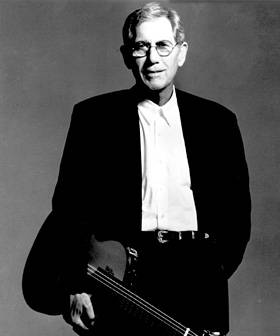 |
Atkins expressed
interest in Reed signing to RCA and Reed broke the news to a Columbia
Records executive that he would like to go to RCA.
"It really broke his heart," Reed recalled, later.
"Took him about 30 seconds to let me go."
Atkins was determined to record Reed as an atypical artist rather than
moulding him into a pre-established model.
In his guitar work and in the songs he wrote, Reed revealed humour and
wit that set him apart from other performers and endeared him to audiences.
The key was capturing that in a way that didn't dull spontaneity or intelligence,
and Atkins figured he knew how to do this.
Rather than asking Reed to write or record for a particular audience demographic,
as he'd done on Capitol and Columbia, Atkins insisted that Reed be Reed.
"I owe almost every bit of success that has come to me to Chet Atkins,"
Reed told the Associated Press in 1999.
"He's a non-conformist, and he suggested that I just play my guitar
and sing my songs and he'd release singles."
The first result of Atkins' prodding was instrumental showcase The Claw,
so named because of the way Reed's hand looked when playing in his intricate
style.
THE ELVIS HITS
"Well, I quit my job down at the car wash/ left my mama a goodbye note/ by sundown Id left Kingston/with my guitar under my coat/ I hitchhiked all the way down to Memphis/ got a room at the YMCA/ for the next three weeks I went huntin' them nights/just lookin for a place to play/ well, I thought my pickin would set em on fire/ but nobody wanted to hire a guitar man." - Guitar Man - Jerry Reed.
Then, Reed
came up with Guitar Man, which showcased his guitar work, voice
and his storytelling ability.
Although Guitar Man peaked at a dismal No. 53, the song got the
attention of Presley, who recorded the song and wanted Reed to recreate
the funky guitar riff he used on his original version.
Guitar Man was followed by Tupelo Mississippi Flash, which
became Reed's first Top 20 hit, in 1967.
Tupelo Mississippi Flash poked fun at an industry executive who
didn't understand the power and reach of Elvis.
Presley was unhappy with others' attempts to recreate Reed's guitar sound,
and Reed received a telephone call from producer Felton Jarvis, asking
how he did what he did. Reed told Jarvis that the only way to get the
Jerry Reed sound was to have Jerry Reed on the session, asserting that
most studio players are "straight pickers," while, "I play
with my fingers and tune that guitar up all weird kind of ways."
Jarvis and Presley took note, and Reed performed on the Elvis sessions.
In a 2005 interview with CMT Reed said he didn't recall being nervous
as he showed up for Presley's Guitar Man session in Nashville.
"I'd have been nervous if I had to do something I didn't know how
to do," Reed said. "Elvis had heard my album cut, and he wanted
it to sound like that. His producer was an old friend of mine from Atlanta,
Felton Jarvis, who said, 'Well, you're gonna have to get Reed in here
to play on it then. He's a fingerpicker, and these guys don't have any
idea what he's doing because he does all this weird stuff anyway. He tunes
them strings weird.' So I got in there and I turned that E-string down
and that B-string up and hit that intro. I wasn't worried about playing
that."
At the same session, steel guitarist Pete Drake urged him to pitch another
song to Presley.
"Pete and I knew each other in Atlanta, when I was working at a cotton
mill and he was driving a Merita bread truck," Reed noted.
"He said, 'Have you got anything else?' I said, 'No, man. Listen,
this is enough for me, believe me.' Then Elvis said, 'Yeah, have you got
any other songs?' I said, 'Well uh yeah.'"
When Reed mentioned the title, U.S. Male, Presley said, "Let
me hear it."
"So I cut down on U.S. Male, and he said, 'Let's cut that
thing,'" Reed recalls.
"It was that easy. Absolutely that easy."
ALABAMA WILD MAN IN MOVIES
"Now my daddy was a hard shelled Alabama preacher/my mamma was a dedicated Sunday school teacher/my brother went to college and got a PHD/Daddy said the only dud in the family was me." - Alabama Wild Man - Jerry Reed.
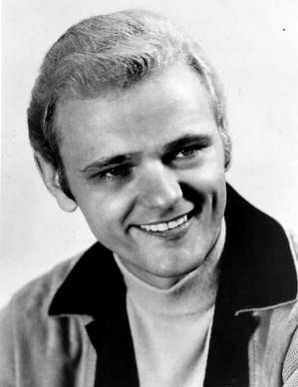 |
Reed
wrote Alabama Wild Man, a Top 50 country hit in 1968 that gave
the native Georgian a fun but geographically incorrect nickname. Bobby Bare said the only thing wild about Reed was his onstage persona. "He was actually the opposite of the 'wild man' thing," said Bare, who spent hundreds of hours fishing with Reed on placid lakes where wildness isn't in demand. Reed, the product of a broken union, stayed married to Prissy Hubbard until his death. But his breakthrough moment came in late 1970, when the funny, funky and swampy Amos Moses landed in the Top 10 of the pop charts and in the Top 20 of the country charts. An instrumental with Atkins won a Grammy in 1971, and the following year he won a best country male performance Grammy for his first No. 1 country smash, aptly titled When You're Hot, You're Hot. |
Two years
later, he hit #1 again with the Dick Feller penned lament, Lord, Mr.
Ford.
During this
time, Reed appeared regularly on friend Glen Campbell's Goodtime Hour,
with his charisma shining for TV and movie moguls.
In 1974, he played a joke-cracking role in W.W. and the Dixie Dance
Kings.
His best-loved film role came in 1977, when he starred as Cledus Snow,
a.k.a. The Snowman, in Reynolds' movie Smokey and the Bandit.
Reed and Feller co-wrote the movie's theme song, East Bound and Down,
which spent two weeks at No. 2 on the Billboard Country singles chart.
"We were fishing out at Percy Priest Lake and Jerry told me about
a movie coming out called Smokey and the Bandit," Bare recalled.
"I didn't think too much about it at the time. We were chasing rockfish.
But when I watched him on the screen, I realised he was a really good
actor."
DICK FELLER
"Well,
I figured it up and over a period of time/ this four thousand dollar car
of mine/
Costs fourteen thousand dollars and ninety-nine cents/ well, now Lord
Mr. Ford, I just wish that you could see/ what your simple horseless carriage
has become/ well, it seems your contribution to man/ to say the least,
got a little out of hand/ well, Lord Mr. Ford, what have you done."
- Lord Mr Ford - Dick Feller.
Missouri
born Dick Feller vividly recalls writing Lord Mr Ford after he
penned 1971 Tex Williams hit The Night Miss Nancy Ann's Hotel for Single
Girls Burned Down.
Jimmy Dean's producer asked Feller to write a song for Dean with a similar
feel to it.
"I decided to write a song about automobiles in a kinda Jerry Reed
style," Feller revealed.
"The result was Lord, Mr. Ford. Dean decided to not record
it and I was left with a song but no singer. I then suddenly he had a
dream. I dreamed that I took the song to Reed's publishing company. So
I did."
After having heard Feller sing the song once, Reed said he wanted to record
it.
He also decided to record two other Feller songs The Lady Is A Woman
and One Sweet Reason.
Lord, Mr. Ford became Feller's biggest song-writing break and beginning
of a long-lasting association between Feller and Reed.
Feller signed to Reed's own publishing company, Vector Music, as a staff
writer in 1975, and Reed and Feller became co-writers for some years.
They co-wrote several songs including East Bound And Down for movies,
such as Smokey and the Bandit.
Feller also wrote The Bandit and other tunes for Reed's albums.
At that time Feller was also touring as opening act for the Jerry Reed
show.
Reed reprised his role as Cledus "Snowman" Snow with Reynolds
in other Smokey and the Bandit films released in 1980 and 1983.
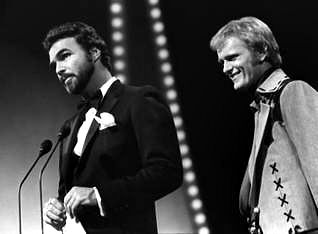 |
His
additional acting credits include High Ballin' (with Peter Fonda)
and Hot Stuff (with Dom DeLuise). More recently, he starred as Red Beaulieu, a sadistic college football coach, in the Adam Sandler hit, The Waterboy. Reed continued to perform and appear on television and movies, including BAT 21. Reed was especially proud of his final project, The Gallant Few - an album made to raise funds for wounded veterans. |
In a 1998
interview with The Tennessean, he admitted that his acting ability was
questionable.
"I used to watch people like Richard Burton and Mel Gibson and think,
'I could never do that.'
"When people ask me what my motivation is, I have a simple answer:
Money."
A PICKER'S PICKER
"While she's livin' like a queen on alimony/ I'm workin' two shifts eatin' baloney/ askin' myself, "Why didn't you just learn how to cook?!?!"/ they give her the gold mine! she got the gold mine!/ they give me the shaft. I got the shaft." - She Got The Gold Mine, I Got The Shaft - Jerry Reed
The Hollywood
success and country hits won Reed casual fans, but musicians also took
notice of the staggering virtuosity behind the records.
Brent Mason, now the top session man in Nashville, calls Reed his favourite
guitar player of all time.
"He called himself a 'guitar thinker,' not a 'guitar player,'"
Mason said.
"He would find new ways to play things, and you can play his songs
over and over and hear something new inside them every time. I've been
stealing from Jerry Reed for years. It was extraordinary, brilliant playing."
And scores of others sought to decipher the secrets behind Reed's rocket-fuelled
licks. Reed notched another #1 hit She Got The Goldmine (I Got The
Shaft) and a #2 effort with The Bird.
Reed had no Top 20 hits after 1983 - his triumphs were limited to live
performance and movie roles.
But he released a concert album not so cryptically titled Live Still
in 2005 and said he was writing a series of instrumentals he hoped to
have recorded by other guitarists.
Considering his accomplishments in film and music, Reed said he had a
one-word job description.
"Entertainer," he said. "I think that covers me pretty
well."
But his guitar sound in the years between 1967 and 1983 is an influence
that is more than temporary, more than a wisp of smoke.
"Like Django (Reinhardt), Chet and a few others, Jerry Reed created
a unique style of guitar playing, one which will be carried on by admirers
for generations to come," said esteemed musician David Hungate Scholar
John Knowles.
"His playing has the complexity of classical music but the rhythmic
sense that comes from country, rock and gospel."
There were plenty who never knew of Reed as anything more than The
Snowman, or as the coach in The Waterboy.
He was funny, and an entertainer, and in terms of movie-making that was
enough.
Yet Reed was also one of the most compellingly original guitarists of
all time.
He understood that most of the general public didn't know that, and fully
understood that many session guitarists not only understood it but attempted
to replicate his feel and technique.
BRAD PAISLEY PRAISE
"Why,
they give her the colour television set/ then they give her the house,
the kids, and both of the cars! See?/ well, then they start talkin' 'bout
child support/ alimony, and the cost of the court/ didn't take me long
to figure out how far in the toilet I was!
I'm tellin' ya, they have made a mistake/ 'cause it adds up to more than
this cowboy makes!" - She Got The Gold Mine, I Got The Shaft -
Jerry Reed
| "All
of us pickers owe him so much," said recording artist and guitar
player Brad Paisley. "Jerry Reed's instrumentals are required learning if you want to play country guitar. And every move he made was to entertain, and make the world more fun. Because he was such a great, colourful personality with his acting and songs and entertaining, sometimes people didn't even notice that he was just about the best guitarist you'll ever hear." Reed's only regret regarding the guitar was that his declining health meant he could no longer play. Making music would have been a comfort in his final months. Instead, he enjoyed the company of family, and the visits from old friends like Lee and Bare. |
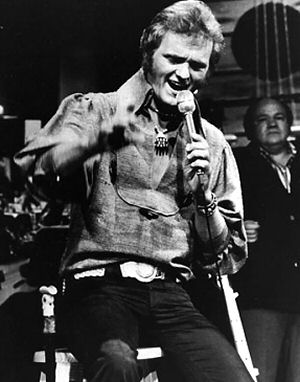 |
They told stories and jokes, and Reed sometimes got to laughing so hard that he had to pause and try to be serious in order to catch his fragile breath.
They talked
about the good times and the dumb luck, and the fullness of some lives.
And on an August day, Reed told Bare something he'd been thinking a lot
about: the fact that everything he'd ever dreamed had come true.
And he was fine with all of that.
"Every dream I ever dreamed came true in my life," he told interviewer
Calvin Gilbert in 2005.
"I got to write hit songs. And I got to be on phonograph records.
I'm a cotton mill boy, and I got to go to Hollywood. Can you imagine that?
Why, yeah, my goodness gracious. Go figure."